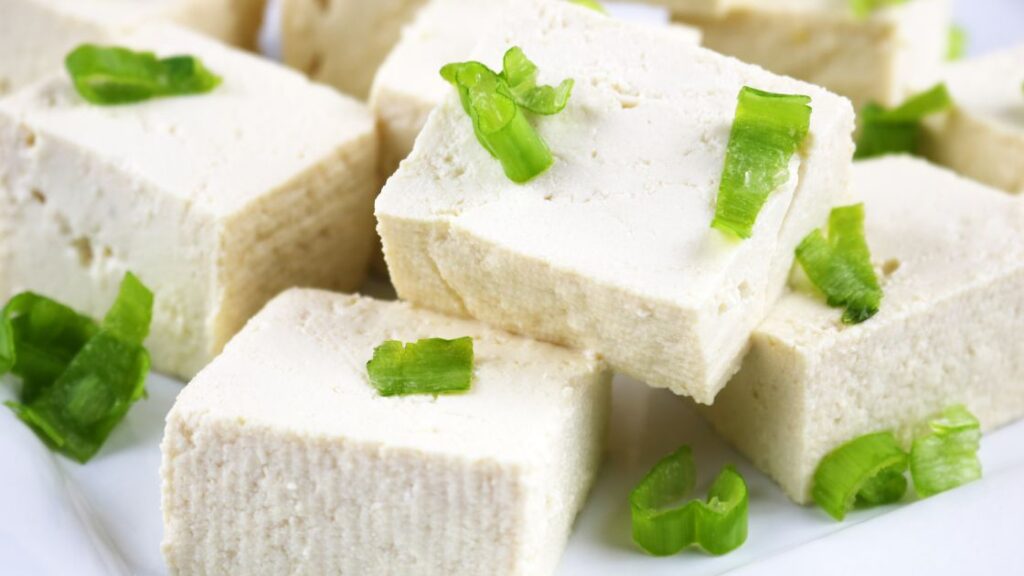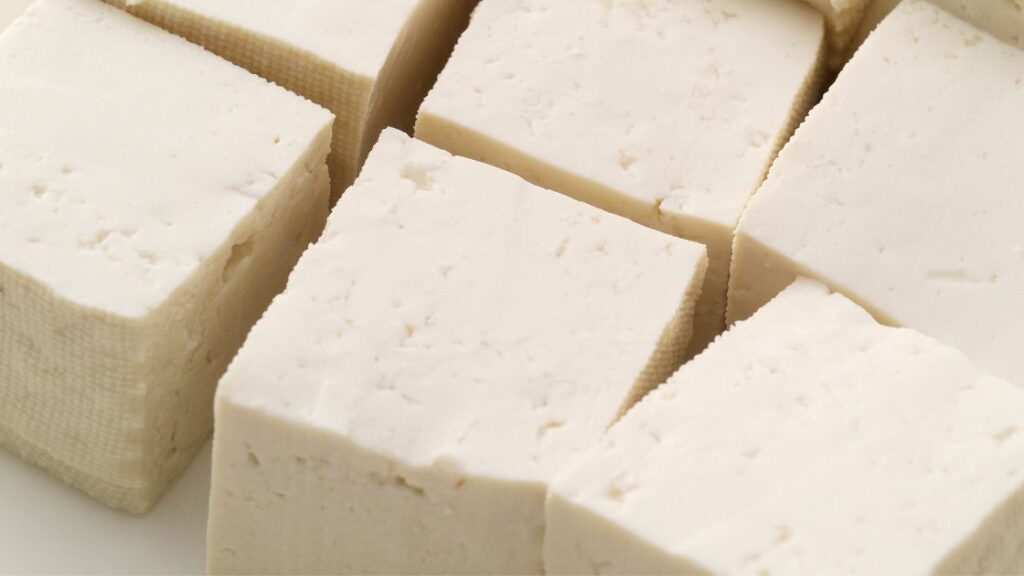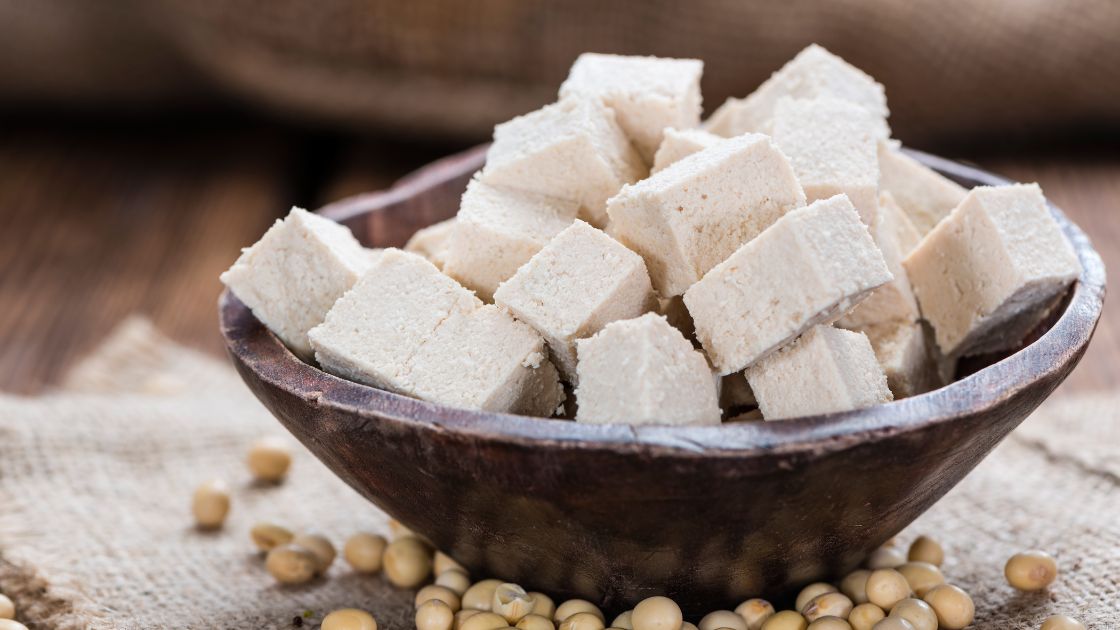- It is a nutritious and complete food that offers a high vitamin content and contributes to general well-being
- It is a versatile ingredient that can be used in both savory and sweet recipes
- It is rich in essential vitamins and minerals, including selenium, magnesium, vitamin K, calcium and many more
- It has several health benefits, including potentially lessening menopause symptoms and serving as a “complete” plant protein source
- While tofu is generally considered safe for most people, those with soy allergies or thyroid issues may need to limit their intake
If you are looking for nutritious and complete food, tofu is an option that you should consider.
It has a high vitamin content and contributes to general well-being.
If you want to know more about the health benefits of tofu, keep reading.
Here, you will also learn how to prepare tofu and whether it is safe to consume.
You will be surprised at the tremendous nutritional value it has.
Where does tofu come from?
This ancient and nutritious food originates from China and is particularly popular in Japanese and Korean cuisine.
It is also a favorite in vegetarian and vegan meals.
Tofu is made from soy milk that has been cooked and shaved.
It is known as soy cheese or tofu cheese because the preparation is similar to cow cheese.

What distinguishes tofu from other foods?
The texture of tofu or soy cheese can be soft or firm and has a mild flavor and color.
It is a good source of antioxidants, isoflavones, proteins, fiber, and vitamins.
The following are the essential vitamins and minerals you can find in tofu:
- Selenium
- Magnesium
- Vitamin K
- Calcium
- Thiamine
- Iron
- Riboflavin
- Vitamin B-6
- Niacin
- Choline
- Folic acid
- Phosphorus
How to eat tofu?
Tofu may be eaten in several ways. It can be used in both savory and sweet recipes due to its versatility.
You can eat it in lasagnas, pizzas, vegetable quiche, cream, soups, vegan burgers, salads, cheese bread, gratin vegetables, and pudding.
If you are a vegetarian or intolerant to meat and need to consume protein, tofu will be your ally.
You can start introducing these food options into your daily diet as a substitute for dairy products and meat.
You can also consume tofu in pates and pastes on a grill, roast, or uncooked.
How to prepare and cook tofu?
If you want to prepare your tofu at home, you only need 1 kg of soybeans and filtered water. To prepare it, follow these steps:
- Soybeans should be washed with running water.
- Reserve the items in a jar with around 3 liters of water after washing, and let the beans soak at room temperature for 8 to 10 hours.
- In the blender, all the grains are combined with filtered water after 8–10 hours (with 1 cup of water for every 1 cup of soybeans).
- 4.5 liters of water are heated in a pot while the beaten soy is set aside
- Put the beaten soy in hot water when heated and stir continuously until it boils.
- Turn off the heat once the contents are boiling and stir them while separating the soy from the milk with a thin towel.
- Prepare the coagulant: Use 5 teaspoons of bitter salt, calcium chloride, or magnesium sulfate. Ideally, dissolve them in 1/2 cup of warm water.
- Carefully stir in the coagulant while heating the milk.
- The developed clots are collected with a skimmer, covering the surface with a perforated pattern.
- To give it shape, weight must be applied for ten minutes. The tofu should be placed in a deep container and covered for 10 minutes with cold and filtered water.
- The tofu should be left in an ice-filled container after being unshaped.
The water in the tofu should be changed every day, and it should be kept in the refrigerator. It usually has a five-day validity period.

What are the tofu nutrition benefits?
This powerful food’s nutritional benefits make it popular and desired by many.
For every 100 gr of tofu serving, you can get:
- 0.7g Carbohydrate
- 4.2g Fat
- 0.5g Saturated fat
- 8.1g Protein
And best of all, it is low in calories, only 73 kcal / 304KJ per 100 gr.
Tofu’s calcium levels vary, so read labels and look for a product that is ‘calcium set,’ which means it contains calcium chloride (E509) or calcium sulfate (E516).
What are the main 5 health benefits of tofu?
Tofu can help you improve your overall physical and mental health.
This is a source of proteins, carbohydrates, and vitamins, which aid in the proper functioning of the body.
Tofu also aids in the prevention of a variety of diseases, including breast cancer, and balance your blood pressure.
But the top 5 main benefits are the following:
Could lessen menopause symptoms
Isoflavones are also known as phytoestrogens, which means they mimic a weak form of the hormone estrogen in the body.
This helps some women with perimenopausal symptoms such as low mood and hot flashes.
Although the intestinal microbiota, genetics, and environmental factors play a role in how our bodies react to certain foods, it cannot be guaranteed that a diet based on these foods is beneficial for all women.
Source of antioxidants that preserve health
Soya beans are high in isoflavones and other active plant compounds like saponins.
Soy food such as tofu contains natural compounds known as isoflavones, which are powerful antioxidants that help reduce the damage caused by molecules known as free radicals.
This oxidative stress is linked to aging and the onset of some chronic diseases.

Benefit heart health and avoid cardiovascular disease
Regular consumption of isoflavone-rich foods like tofu has been linked to lower cholesterol levels.
According to health care studies, this includes a decrease in low-density lipoprotein (LDL), also known as “bad” cholesterol, and total cholesterol.
Regular consumption of legumes, including soya, has been linked to a lower risk of heart disease and cardiovascular disease.
This is due to their high concentration of phytochemicals and fiber.
Help with blood sugar control
In one study, postmenopausal women who ingested 100 mg of soy isoflavones daily reported a 15% and 23% decrease in fasting blood sugar and insulin levels.
Similarly, soy protein isolate supplementation in diabetic postmenopausal women improved cholesterol control and reduced fasting insulin and insulin resistance.
A meta-analysis indicates that we still have more to learn in this area, although other research has yielded conflicting results.
However, further research is required before we can say that eating soy products like tofu is beneficial.
‘Complete’ plant protein source
The human being needs essential amino acids for its functions of repair, growth, and strengthening of immunity.
Tofu and soybeans contain a high value of protein that provides 9 essential amino acids.
The soy protein’s ability to be absorbed by our bodies is good.
Some research suggests that it may even be on par with animal protein.

Can everyone eat tofu?
Except for those who have a soya allergy, tofu is generally considered to be harmless for most people.
Additionally, soybeans are thought to be goitrogenic, which interferes with the thyroid’s ability to function.
If you have a thyroid issue, you might want to limit your intake even if this effect is negligible.
Oxalate is present in tofu and other soy products; those who have previously experienced calcium oxalate kidney stones may decide to limit their intake.
However, soy products with some oxalate and a moderate amount of phytates can be helpful for people who are suffering from kidney stones.
Enjoy the health benefits of tofu
You can receive numerous benefits if you eat the required grams of tofu. Including it in our daily diet will provide us with many important nutrients.
After reading this blog, you now know how to prepare it at home and include it in delicious dishes.
So, do not hesitate to try it and start enjoying the wonderful health benefits of tofu.

I am a professional health and nutrition writer with extensive experience in the industry. My passion for sharing valuable insights on nutrition and wellness stems from over 15 years of personal training and maintaining a healthy lifestyle. My commitment to continuously educate myself on the latest trends and research in the field allows me to deliver high-quality content that is informative and engaging. My mission is to empower individuals to make informed decisions about their health and well-being through my writing.









